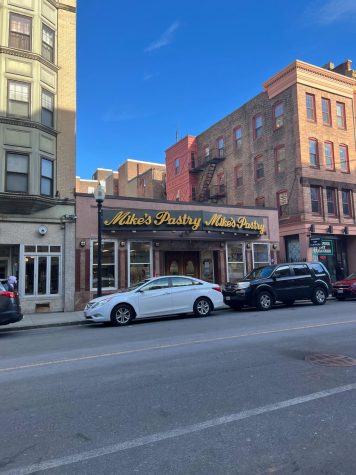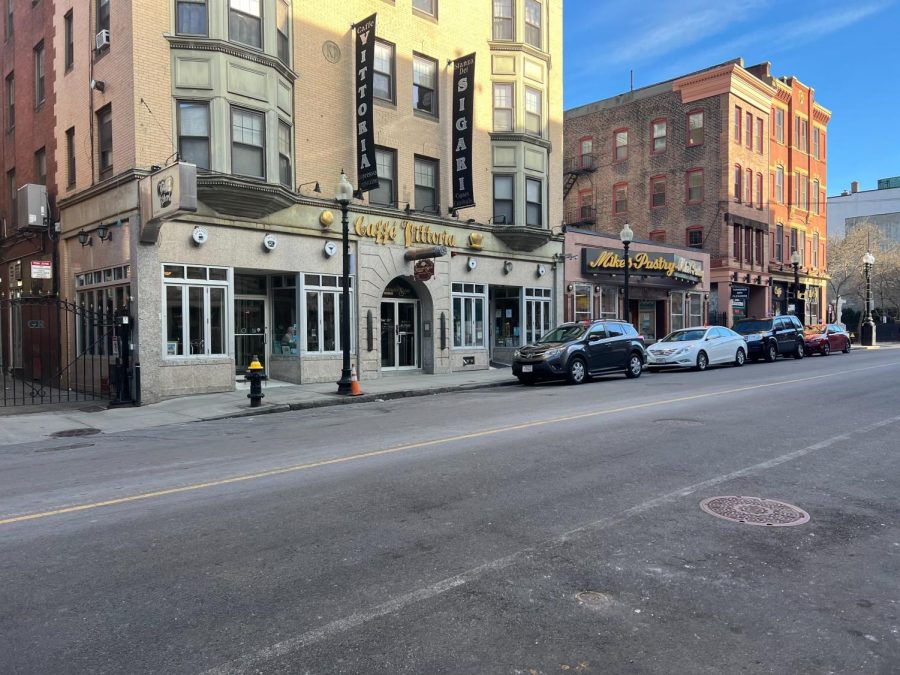North End outdoor dining fees spark outrage, potential lawsuits from restaurant owners
Restaurants in Boston’s historic North End have erected outdoor patios for the past two summers to keep up with dining despite the COVID-19 pandemic. Photo credit to Jess Silverman.
April 3, 2022
Before patrons can bring their business to the North End for outdoor dining this summer, restaurants will have to open their wallets for the City of Boston.
In a meeting with restaurant owners March 17, city officials announced that North End restaurants will have to pay a $7,500 fee to open a patio space for outdoor dining. Restaurants must pay an additional fee of $458 a month per parking space that is unusable because of outdoor dining. On top of the newly imposed fees, the start of outdoor dining in the North End will be delayed until May 1, nearly a month after the original date of April 8.
In response to the new policy, restaurant owners banded together to form the North End Restaurant Community and released a letter March 23 detailing their grievances and alleging discrimination by the city. The primary question asked by the group is why the fees afflicting the North End do not apply to any other neighborhoods.
It’s the principle, or lack thereof, that is the cause of the North End’s outrage, said Kim Fontaine, owner of Rabia’s Dolce Fumo. Her restaurant suffered losses of 15-22% in revenue per week at the height of the COVID-19 pandemic in 2020 and 2021. While the business is recovering, Fontaine said, she still finds the new fees to be exorbitant and unfair to the community.
For small restaurants, the monthly cost of a parking spot could significantly eat away at profits that have already taken a hit because of the pandemic.
“I’m not worried about us. We’ll be fine,” Fontaine said of her restaurant. “It’s the smaller restaurants that won’t be able to afford it.”
Fontaine said she plans on suing the city, as a growing number of North End restaurant owners are considering pursuing litigation against Boston and Mayor Michelle Wu. About 60 restaurant owners met with a lawyer over Zoom March 25, and others have sought legal counsel.
After much public outcry, Wu held a press conference at City Hall Tuesday, standing alongside state Rep. Aaron Michlewitz, state Sen. and City Councilor Lydia Edwards and North End restaurant owners Nick Varano and Philip Frattaroli, clarifying and announcing rectifications to the policy to support restaurants still struggling from the slowed business caused by the COVID-19 pandemic.
“What I love about this job and city government is that everything we do, we are trying to meet people where they are, and that means that equity doesn’t mean equality all across the board,” Wu said in the press conference. “One of the particular quality of life issues in this neighborhood, in the North End, was related to the impacts of outdoor dining.”
Wu stated that restaurants will not be required to pay the $7,500 fee upfront — the program was designed with the intention that participating restaurants could pay out the fee in monthly installments. Furthermore, restaurants will have the option to only pay $1,500 for each month that they elect to participate in outdoor dining, Wu said.
Wu also announced the implementation of a “hardship waiver” that grants qualifying restaurants a reduced fee based on three factors: whether the business has a liquor license, which could bring in higher sales; the size of the restaurant’s patio space, which dictates how many more people could be served; and whether the restaurant is in a location conducive to foot traffic, such as Hanover Street or Salem Street.
Wu responded to the backlash in a letter sent to North End restaurateurs March 25 where she doubled down on the implementation of fees and tougher restrictions in the neighborhood. Wu also wrote she was prepared to rescind outdoor dining in the neighborhood if a “critical mass of restaurant owners” found the plan to be unworkable.
When asked if rescission was still on the table at Tuesday’s press conference, Wu said outdoor dining was a discretionary permit from the public works department.
“It was important to clarify that this is not a program that the city has guaranteed for any part of the city,” Wu said during the press conference. “From what I see today, it seems like there is a critical mass of restaurant owners who believe that this can work.”
However, some restaurant owners are still not satisfied and some claim they were not allowed access to the press conference. A group of restaurant owners held a press conference outside of Terramia Ristorante shortly after the press conference at City Hall, where they continued to protest the North End-specific fees.
According to the city, the money collected from these new fees will be directed toward mitigating the impacts of trash and rodents, as well as increasing public safety. However, business owners aren’t buying this justification.
Fontaine said Rabia’s Dolce Fumo contracts out a sanitation service to take care of their trash and any potential pests. If residents have a problem with litter and rodents, the city’s sanitation department is to blame, she said.
The North End housed 77 dining patios last year, 70 of which were on public property. As a result, Wu explained in a letter, residents were “at their wit’s end,” with City Hall fielding 311 constituent complaints about noise, congestion and cleanliness.
“Street parking was very challenging in the North End, and now that the patios take some of the parking space, it’s become even worse,” North End resident Alex Shvartz said. “I know people who have had to get rid of their cars because they’ve been unable to find parking. And I know people complain about noise and trash — those are the main concerns.”







